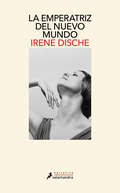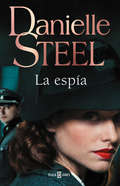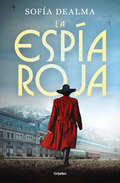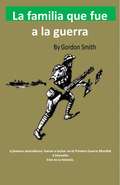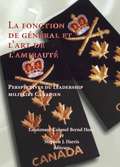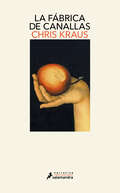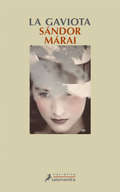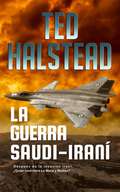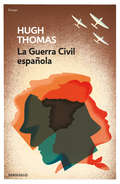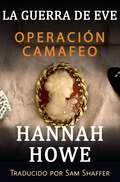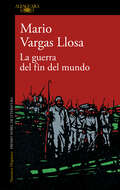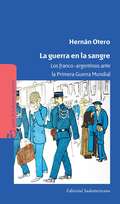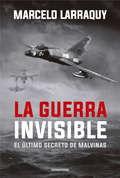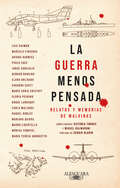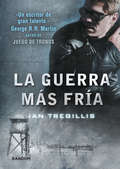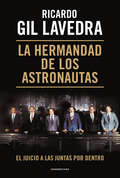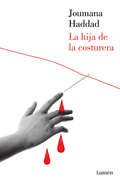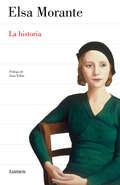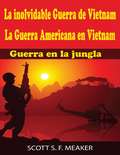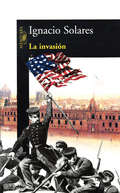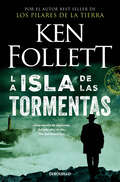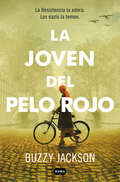- Table View
- List View
La emperatriz del nuevo mundo
by Irene DischeUna historia conmovedora sobre la relación entre una abuela, su hija y su nieta en la bulliciosa Nueva York de la posguerra. Elisabeth Rother, la emperatriz del nuevo mundo, ha decidido escribir sus memorias y no piensa morderse la lengua. Y para ello hace un recorrido por el clan de su familia alemana católico-judía afincada en Estados Unidos: su marido, un médico judío converso; su talentosa hija, Renate; su nieta, Irene Dische, pasando por capítulos enteros de la historia del siglo XX, desde el ascenso del nazismo en Alemania hasta su exilio forzoso en Nueva York. Pero en el centro de sus preocupaciones está la rebeldía de Renate e Irene. La emperatriz del nuevo mundo es tanto un singular relato sobre la inmigración y la vida en Nueva York de toda una generación que tuvo que huir de sus países por culpa del nazismo, como una carta de amor conmovedora sobre la relación entre abuelas, madres e hijas. La crítica ha dicho:«Increíblemente ingenioso, escrito de un modo precioso, La emperatriz del nuevo mundo es un potente guiso de clase, sexo y religión, además de choques culturales y generacionales. Dische recrea a una magnífica misántropa en la versión novelada de su abuela.»The Star-Ledger «Brillante, desconcertantemente divertida, la narradora es todo lo cautivadora que un lector podría desear. Una exploración maravillosa del honor y la identidad, la codicia, el sacrificio y las disputas. Al igual que los ritmos de staccato de Dische y las frases inexpresivas se extienden hasta alcanzar el lirismo, también lo que parece crudo, incluso cínico, se convierte en un amor nada sentimental, profundamente gratificante (y a veces temible).»Newsday «No puede decirse que los narradores egocéntricos e insufribles sean extraños para la ficción contemporánea, pero ayuda si son tan divertidos como grandilocuentes. [...] La voz de la emperatriz réproba es perfecta. [...] Dische ha recreado a su abuela novelada con habilidad y gracia.»The Boston Globe «Un viaje vívido y divertidísimo. [...] Lo verdaderamente elevado de La emperatriz del nuevo mundo yace en la voz de la narradora. Clara como el agua, con una inequívoca personalidad propia, Frau Rother se retrata con la precisión del escalpelo de un cirujano. Y eso es lo que hace la autora aquí, llevar a cabo la autopsia de los personajes de su familia.»Los Angeles Times
La espía
by Danielle SteelDanielle Steel nos transporta desde la Segunda Guerra Mundial hasta los años de la Guerra Fría en esta historia repleta de emoción y aventura. A los dieciocho años, Alexandra Wickham se presenta ante el rey Jorge V y la reina María de Inglaterra con un exquisito vestido de satén y encaje blanco. Bella y deslumbrante, parece destinada a tener una vida privilegiada, pero su personalidad rebelde y el estallido de la Segunda Guerra Mundial la llevarán por un camino muy diferente. En 1939, Europa está en llamas y Alex se presenta voluntaria como enfermera. Inmediatamente, su talento y la fluidez con el francés y alemán llaman la atención de los servicios secretos del Gobierno. Mientras sus seres queridos pagan el terrible precio de la guerra, Alex se convierte en Cobra, una espía que opera tras las líneas enemigas jugándoselo todo a vida o muerte. Con un día a día marcado por el secreto que debe guardar pase lo que pase, el precio que Alex tiene que pagar es que nadie descubra su doble vida, ni siquiera Richard, el piloto que le ha robado el corazón. Citas de lectoras y blogs:«La espía es una historia adictiva sobre una mujer joven y valiente que lo arriesga todo por hacer lo que le dicta su corazón.»Blog Mrs Book Reviews «¡Te lleva de Gran Bretaña a Francia, Rusia, India, Estados Unidos e incluso Marruecos, como un trotamundos! ¡Una auténtica experiencia! Una historia de relaciones familiares, amor, pérdida, defensa de las creencias y compromiso.»Blog Mrs Book Reviews «Realmente disfruté con esta novela única. No solo es histórica, sino también fascinante. Una gran lectura.»Blog Hey It's Carlyrae
La espía roja
by Sofía DeAlmaUna novela inspirada en la vida de Marina Vega de la lglesia, la única española en la resistencia francesa, espía y cazanazis condecorada por el Parlamento Europeo por su defensa de la libertad. Esta es la vida de Marina, la niña republicana que se lanzó al combate solo con la fuerza de su determinación, que se hizo mujer durante la lucha y que envejeció en el anonimato hasta que la historia la rescató.Si alguien merece ser recordada es precisamente ella. Marina Vega tiene veintiún años cuando termina la Segunda Guerra Mundial. Pese a su corta edad, ha vivido una existencia apasionante. Siendo solo una adolescente, tuvo que abandonar España y colaborar con la resistencia francesa como espía ayudando a refugiados y salvando a judíos de la persecución nazi. Ahora, sin trabajo y sin obligaciones, el destino vuelve a salir a su encuentro. Le tiene reservada una última sorpresa, un ofrecimiento que no puede rechazar: reanudar su misión de dar caza a los oficiales de la Wehrmacht y de las SS que tratan de huir de la justicia. Pero la joven no puede ni imaginar el peligro que está a punto de afrontar ni cómo su pasado -primero en la España republicana, luego en la franquista- o sus actividades en la resistencia le van a pasar factura. Porque pronto va a cerrarse un círculo perfecto de odios y de venganzas. Solo una mujer española luchó en la resistencia francesa. Su nombre era Marina Vega. Fue condecorada por el Parlamento Europeo por su defensa de la libertad y después, olvidada. Esta es su historia.
La familia que fue a la guerra
by Gordon Smith Carla Jessica ScottaHistoria de seis australianos durante la Primera Guerra Mundial. Seis fueron a pelear; solo tres regresaron. En 1914, Australia se unió a Inglaterra y le declaró la guerra a Alemania y sus aliados. En la pequeña localidad de Cootamundra, en Nueva Gales del Sur, seis jóvenes australianos, todos de la misma familia, se unieron al combate de manera individual. Este relato narra sus viajes por Galípoli y el Frente Occidental. El relato también cuenta sobre el tiempo que pasaron en Egipto, Inglaterra y Francia cuando no estaban peleando. Esta es la historia de una familia y cómo se vio afectada por una guerra que transcurría del otro lado del mundo. Narra las batallas, las heridas y las enfermedades que debieron soportar estos jóvenes, así como momentos menos crueles. Un relato ameno que muestra cómo fueron esos tiempos de oscuridad. Género: HISTORIA / Australia y Nueva Zelanda Género secundario: BIOGRAFÍA Y AUTOBIOGRAFÍA / Militar Idioma: Español
La fonction de general et l'art de l'amiraute
by Stephen Harris Colonel Bernd HornCette collection, qui regroupe des essais redigés par des officiers des Forces canadiennes et par d’éminents auteurs et universitaires canadiens, fait état de l’expérience canadienne unique et donne un aperçu des changements dont le commandement au sein des forces armées a fait l’objet. Ce livre examine tout particulièrement le travail des généraux - à l’aide d’un certain nombre d’éléments tels que l’expérience historique, la nature du commandement, les operations récentes, les relations entre les civils et les militaires y compris celles avec les médias, les rôles et les responsabilités fonctionnelles liées au travail des généraux.
La fábrica de canallas
by Chris KrausLa última revelación literaria de Alemania: «una grandísima novela» (Le Monde) que retrata el declive de una época y el advenimiento de una nueva era. En la línea de Las benévolas, de Jonathan Littell, La fábrica de canallas es una novela que excede todos los límites, un magnífico fresco histórico y familiar que retrata los años más sombríos del siglo XX. En 1974, en un hospital bávaro, Koja Solm, un anciano con una bala alojada en la cabeza, decide contarle su vida a su compañero de habitación, un joven hippie y pacifista. A través de episodios entrelazados, desde Riga a Tel Aviv, pasando por Auschwitz y París, La fábrica de canallas nos lleva a zonas donde la moral y la integridad son ultrajadas con violencia para contarnos cómo fue todo al final de la Segunda Guerra Mundial. La crítica ha dicho...«Una obra maestra cautivadora. Un libro fascinante, de gran poder visual y emocionante. Extraordinario.»Focus «Como una serie: ritmo trepidante, giros argumentales y personajes intrigantes. ¡Genial!»Die Zeit «Manejada con una brillantez poco común, esta novela trata de una metamorfosis monstruosa, la que convierte a un hombre en nazi.»Transfuge «Excepcional. Una historia sensacional, magníficamente contada.»Neue Züricher Zeitung «Un gran escritor.»MDR «¡Sublime!»Madame «¡Una auténtica obra maestra!»Neon «Un retrato magistral de las profundidades morales de la política, el amor y la sociedad del siglo XX.»Donna «Un retrato excepcional de la pasada centuria.»Augsburger Allgemeine ¡Una trepidante saga familiar!»Hörzu «Un narrador nato.»Süddeustche Zeitung «Imprescindible.»Deustchlandradio Kultur «Una obra de arte.»Berliner Morgenpost «¡La mejor novela que he leído en los últimos años!»SWR «Se lee de un tirón.»Der Tagesspiegel «Una novela río que acarrea todas las sombras de la historia.»L'Express «Fresco histórico, relato de espías, fábula política; en este laberinto literario, uno se pierde con deleite.»Lire
La gaviota
by Sándor MáraiPublicada por primera vez en 1943 -en un período de la segunda guerra mundial de extraordinaria tensión e incertidumbre en Hungría, cuyo régimen se había alineado con la Alemania nazi-, La gaviota es una muestra más de la incomparable prosa, incisiva y sin concesiones, de Sándor Márai, uno de los grandes escritores del siglo XX. Alto funcionario ministerial, culto, solitario y seguro de sí mismo, el hombre acaba de dictar una orden de enorme trascendencia, una decisión que en cuestión de horas afectará inexorablemente a millones de personas. Sin embargo, su aparentemente inmutable serenidad se resquebraja con la inesperada aparición de Aino Laine, una hermosa joven finlandesa de nombre poético y que tiene un parecido asombroso con la única mujer que el hombre amó, fallecida años atrás. Entonces, contra lo que aconsejan la prudencia profesional y el decoro, invita a la joven desconocida a acompañarlo esa misma noche a la ópera. Da comienzo así entre ambos un diálogo íntimo y profundo, un juego de seducción no exento de riesgos, donde la pasión, la nostalgia y la fuerza destructora del destino obran una perturbadora transformación en el sólido equilibrio burgués de un hombre sensato y honorable. Reseñas:«Sándor Márai tensa los hilos mágicos de la existencia humana.»SonntagsZeitung «El leitmotiv de la gaviota simboliza la voluntad de vivir y sobrevivir del ser humano, pese a las experiencias nihilistas de los años de guerra en que surgió la novela.»Markus Fischer, Spiegelungen-Zeitschrift f. dt. Kultur u. Geschichte Südosteuropas
La gente como nosotros no tiene miedo
by Shani BoianjiuUna revelación literaria: una joven autora con una audaz y provocadora novela sobre la vida de las chicas soldado en el Ejército Israelí. La premiada autora israelí Shani Boianjiu desvela una realidad desconocida, al tiempo que capta la energía sexual y la efervescente angustia de la adolescencia. Lea, Avishag y Yael son amigas de la escuela en un pequeño pueblo al norte de Israel. Durante las clases sueñan despiertas con los chicos que les gustan. Cuando cumplen los dieciocho años, son reclutadas por el Ejército y su vida cambia de forma inesperada. Yael se acuesta con un chico al que entrena como tirador. Avishag hace guardias y observa a los refugiados que se abalanzan sobre la alambrada. Lea, destinada en un puesto de control, imagina las historias que se ocultan tras los rostros familiares que pasan ante ella día tras día. Las tres viven al filo de la muerte, en la intensidad de ese instante eterno antes de queel peligro estalle. Ganadora del premio «5 Under 35» de la National Book Foundation (nominada por Nicole Krauss), finalista del premio Sami Rohr y del Women#s Prize for Fiction y traducida a 23 idiomas. Reseñas:«Una primera novela tensa como un thriller, romántica y psicológicamente audaz... Boianjiu escribe sobre la atrocidad y el absurdo de una guerra sin fin.»More «Irreverente, conmovedora. Una autora con un inusual talento literario para transportarnos hasta un sitio absolutamente remoto... Un libro provocador e inquietante.»The Jewish Journal «Memorable... Un retrato feroz y hermoso del daño causado por la guerra.»The Washington Post «Único y desgarrador. Leerlo es sentir como si te partieran el corazón en dos.»Etgar Keret «La gente como nosotros no tiene miedo describe en profundidad y con agudeza el efecto desorientador que el miedo produce en las mentes jóvenes.»The Observer «Un debut impresionante sobre la transición a la madurez de tres adolescentes que experimentan lo absurdo de la vida y el amor en el abismo de la violencia.»Vogue «La vida en el Ejército inicia la metamorfosis de niña a mujer. La descripción que Boianjiu realiza de la mente de estas jóvenes es fascinante... La prosa se lee como una pesadilla o un sueño, pero es en esta indecisión febril donde reside su poder.»The Economist «Con su mezcla de brutal hilaridad y emocionante angustia, esta es una primera novela brillante.»The Boston Globe «Las reflexiones de la novela sobre el amor y la pérdida, el deseo y la desesperación, son pura poesía... En esta novela, conviven lo cómico y lo grotesco, al igual que en el Israel de hoy en día.»Los Angeles Review of Books «Shani Boianjiu ha hallado el modo de exponer los efectos de la guerra y la doctrina nacional en la vida de los jóvenes israelíes... Incluso cuando escribe sobre la muerte, Boianjiu está mucho más llena de vida que cualquier otro escritor joven con el que me haya topado en mucho tiempo.»Nicole Krauss «Shani Boianjiu nos ofrece una visión reveladora sobre la juventud de un país marcado por el terrorismo y las fronteras hostiles... La gente como nosotros no tiene miedo marca la llegada de una escritora brillante.»Wall Street Journal
La guerra Saudi-Iraní: Los Agentes Rusos: Libro 2 (Los Agentes Rusos #2)
by Ted Halstead¿Podrán los agentes rusos, los tanques saudíes y la tecnología estadounidense detener a tiempo al Líder Supremo de Irán? El nuevo gobernante de Irán utilizará tres armas nucleares, VX y dos fuerzas blindadas que se dirigen hacia Riad para derrocar a la monarquía saudí. ¿Podrán detenerlo antes de que mueran miles de personas y comience una guerra más amplia en Oriente Próximo? A los aficionados a la ficción militar les encantarán las detalladas descripciones de tanques, drones y ojivas. Pero los aficionados al thriller político disfrutarán con el ritmo y la historia. Se lee como una novela de Tom Clancy, en el sentido de que hay numerosos personajes y muchas partes en movimiento. Sin embargo, a diferencia de Clancy, no hay tramas secundarias que se desvíen. Todas las personas y acontecimientos descritos en el libro conducen directamente a la trama principal, lo que hace que sea una lectura bastante rápida y concisa. Recomiendo encarecidamente este libro, especialmente si sientes curiosidad por la ficción militar.
La guerra civil española: La Guerra Civil Española Vista Por Un Testigo Europeo (Libro De Mano Ser. #Vols. 9-10)
by Hugh ThomasConsiderada una obra maestra que arroja luz sobre una de las guerras más confusas del siglo XX. De una forma brillante y con detalles conmovedores, Hugh Thomas analiza este devastador conflicto en el que las esperanzas, los sueños y las creencias de este siglo estallaron en el campo de batalla. La Guerra Civil refleja, como si de un microcosmos se tratara, las tensiones que llevaron a Europa a la Guerra Mundial: de la puesta en juego de las maquinaciones de Franco y Hitler, a la tragedia de Guernica y la caída de aquellos que creían en la democracia. Críticas:«Un narrador supremo, dotado de una capacidad sobresaliente para la descripción.»John Elliott
La guerra de Eve: Operación Camafeo (La guerra de Eve: Las heroínas de la Ejecutiva de Operaciones Especiales #6)
by Ana HoweMe sentí en la alquería en frente de la fogata y leí el archivo de Vivienne Fernández. Tenía 24 años, vivió en Londres donde, antes de que la Ejecutiva de Operaciones Especiales, era operadora de conmutador. Multilingüe, disfrutó la gimnasia, como Mimi, montar en bicicleta, patinar sobre hielo y hacer vestidos. Sus asesores notaron también que le encantó ir de fiesta. Yo la había conocido en el avión y not´´su elegancia y gracia. Fue de moda, bonita: el paquete completo. Envidia debería de haber asomado su cabeza. En vez de esa, yo sonreía, pensando en ese recuerdo reciente. Me gustó. El esposo francés de Vivienne había muerto peleando con la Francia Libre en Senegal. Ella había dejado una hija de dos años en casa con niñeras. Padre e hija nunca se había conocido. Eso fue triste y demasiado familiar. La madre de Vivienne era inglesa y su padre, francés. Habían vivido en la frontera francesa-española y cuando los Nazis invadieron, se escaparon por los Pirineos. Fue una ruta que supe bien. Arranqué el archivo de Vivienne en tiras y las puse en el incendio. En cuestión de segundos, se convirtieron en cenizas, consumidas por las llamas anaranjadas y amarillas. Me pregunté lo que pensaría Guy de Vivienne. Descubriría sus pensamientos muy pronto cuando regresó de las costa. Me pregunté cómo quedaría en nuestro equipo. Siendo que fue un reemplazo temporal, no preví ningún problema. En retrospectiva, consideraría eso como un error enorme.
La guerra del fin del mundo
by Mario Vargas LlosaLa primera gran novela histórica de Mario Vargas Llosa: un libro fundamental de la narrativa en español del siglo XX «Esta novela me hizo vivir una de las aventuras literarias más ricas y exaltantes».Mario Vargas Llosa «El hombre era alto y tan flaco que parecía siempre de perfil. Su piel era oscura, sus huesos prominentes y sus ojos ardían con fuego perpetuo».A finales del siglo XIX, en las tierras paupérrimas del noreste de Brasil, el chispazo de las arengas del Consejero, personaje mesiánico y enigmático, prenderá la insurrección de los desheredados. En circunstancias extremas como aquéllas, la consecución de la dignidad vital sólo puede venir de la exaltación religiosa y del quebranto radical de las reglas que rigen el mundo de los poderosos. Así, grupos de miserables acuden a la llamada de la revolución de Canudos, la ciudad donde se asienta una comunidad de personajes que difícilmente desaparecerán de la imaginación del lector. Frente a todos ellos, una trama político-militar se articula para detener con toda su fuerza el movimiento que amenaza con expandirse. Publicada originalmente en 1981, La guerra del fin del mundo es la primera gran novela histórica de Mario Vargas Llosa, un libro fundamental de la narrativa en español del siglo XX sobre el que el propio autor ha declarado: «Si yo tuviera que escoger una entre todas las novelas que he publicado, probablemente elegiría ésta, porque la considero el proyecto más ambicioso que me he planteado». La crítica ha dicho:«La escritura de Mario Vargas Llosa ha dado forma a nuestra imagen de Sudamérica y tiene su propio capítulo en la historia de la literatura contemporánea. En sus primeros años, fue un renovador de la novela, hoy, un poeta épico».Per Wastberg, presidente del Comité Nobel «Bienvenido sea [...] el gran recreador de la novela realista, queleemos con el mismo entusiasmo con el que otros leen los excesos imaginativos —bienvenidos también ellos— del realismo mágico».J. A. Masoliver Ródenas, La Vanguardia«Sus libros contienen la más compleja, apasionada y persuasiva visión de la novela y del oficio de novelista de la que tengo noticia; también contienen el mejor estímulo que un novelista puede encontrar para escribir, un estímulo solo inferior al que contienen las propias novelas de Vargas Llosa».Javier Cercas, El País
La guerra en la sangre: Los franco-argentinos ante la primer guerra mundial
by Hernán OteroDe la colección Nudos de la Historia argentina, el impacto de la PrimeraGuerra Mundial en argentinos e inmigrantes. ¿Cuál fue el impacto de la Gran Guerra de 1914-1918 en la Argentina? ¿Cuáles fueron los argumentos que dividieron a la sociedad a favor y encontra de la neutralidad de Yrigoyen? ¿Qué acciones llevaron a cabo lascomunidades migratorias? ¿Qué razones impulsaron a miles de extranjerosy a sus hijos argentinos a combatir o a rechazar abiertamente elimpuesto de sangre? Partiendo del grupo francés, caso límite en larespuesta a la movilización militar, y de documentación inédita dearchivos militares y diplomáticos, el libro analiza la anatomía de ladecisión que desgarró a las comunidades, a los migrantes y a susfamilias. Punto de encrucijada entre la historia cultural de la guerra,la historia de las migraciones y la historia diplomática, el textoaborda asimismo el rol de los diplomáticos extranjeros para doblegar laneutralidad; la integración de los inmigrantes europeos hacia elCentenario; el rol de la mujer; los conflictivos vínculos entreconsulados e inmigrantes; las tensiones entre el derecho del suelo y elderecho de sangre; los dramáticos efectos de la guerra sobre lascomunidades vencedoras y derrotadas; y los límites de cualquierdefinición sencilla de la nacionalidad y de la identidad de laspersonas.Para la colección Nudos de la Historia argentina hemos pedido ahistoriadores de primer nivel que escriban libros sólidos pero a la vezatractivos, susceptibles de ser leídos y disfrutados por personasinteresadas en la historia, aunque carezcan de una formaciónuniversitaria en la disciplina. Esperamos estar a laaltura del desafío.
La guerra invisible: El último secreto de Malvinas
by Marcelo LarraquyLa invasión de tropas argentinas a las islas Malvinas en 1982 desata una guerra invisible, la guerra de inteligencia en torno al arma más temible: los misiles Exocet AM-39. Inglaterra contrataca... En shock por el hundimiento del destructor Sheffield, Gran Bretaña teme una derrota y envía a un escuadrón de ocho hombres a Tierra del Fuego. Tienen una misión imposible: encontrar y destruir los aviones Super Étendard y los misiles Exocet alojados en una base militar de la Patagonia y matar a los pilotos. El 18 de mayo de 1982 el capitán Andrew Legg aterriza con su comando en el sur del continente... Con el ritmo implacable de un thriller e información jamás revelada hasta hoy, Marcelo Larraquy descubre los últimos secretos de inteligencia, espionaje y tráfico de armas de la Guerra de las Malvinas, celosamente guardados por ambos Estados durante casi cuatro décadas.
La guerra menos pensada: Relatos y memorias de Malvinas
by Varios AutoresUn volumen con textos de diecisiete escritores y escritoras de diferentes generaciones que abordan un tema que se mantiene vigente desde hace cuarenta años: la guerra menos pensada, la guerra de Malvinas. Aunque ya han pasado cuarenta años, la guerra de Malvinas sigue siendo una herida abierta, un episodio que no se cierra. Se ha escrito mucho sobre el tema a lo largo de este tiempo pero no hay, que sepamos, ningún libro en el que se haya convocado a distintos escritores y escritoras, de diversas generaciones y estéticas a escribir sobre ella ahora, tantos años después. Este volumen reúne diecisiete textos muy diferentes entre sí, donde encontraremos memorias, crónicas, ficciones y autobiografías sobre el tema con la particularidad de que ninguno de los autores había escrito antes sobre la guerra menos pensada, la que nunca nadie imaginó y que, todavía hoy nos sigue doliendo porque Malvinas está, como suele decirse, en nuestro ADN, en la historia argentina. «Si el origen de la ficción nacional está marcado por la violencia, especialmente la violencia política, y si nuestra narrativa nunca despreció hacerse cargo de los hitos históricos, Malvinas se acomoda perfectamente dentro de esos parámetros. Porque Malvinas es mucho más que una guerra perdida, es la dictadura militar enviando a la muerte o a la mutilación (física, mental) a miles de soldados conscriptos, es un pueblo triunfalista, una muchedumbre que primero aplaudió y luego insultó, es una generación cuya banda de sonido se cantaba en castellano, es la negación en los años siguientes y es el tibio florecer de una consciencia social, de una causa común, de un dolor compartido en las últimas décadas».Del prólogo de Sergio Olguín
La guerra más fría (Tríptico de Asclepia #Volumen 2)
by Ian TregillisSegunda entrega de la historia bélica sobrenatural y alternativa del Tríptico de Asclepia: en 1963 la Unión Soviética ha reemplazado al Tercer Reich como enemigo a batir, y Gran Bretaña fragua la más extraña de las alianzas para evitar su propia destrucción En el ocaso de la Segunda Guerra Mundial los brujos británicos, al servicio de la organización gubernamental secreta conocida como Asclepia, lucharon para derrotar y eliminar de la faz de la tierra al Tercer Reich. Tras su victoria, se estableció un precario equilibrio entre el Imperio británico y la Unión Soviética, que ahora se extiende desde el océano Pacífico hasta el canal de la Mancha. Pero la balanza está a punto de desequilibrarse, pues, en silencio y sin descanso, los poderosos brujos mueren uno a uno en misteriosas circunstancias. Y con cada baja la seguridad nacional se compromete cada vez más. Mientras tanto, dos hermanos escapan de su cautiverio más allá del Telón de Acero. Protagonistas en su día de un retorcido experimento nazi para dotar de superpoderes a simples mortales, posteriormente prisioneros de los equipos de investigación soviéticos por sus preciadas habilidades, ahora su único objetivo es llegar a Inglaterra. Porque allí es donde vive Raybould Marsh. Y Gretel, poderosa clarividente, tiene planes para él... La crítica ha dicho... «Una mezcla entre las novelas de espionaje del primer John le Carré y la fantasía científica de X-Men. Reveladora y profundamente absorbente.» Kirkus Reviews «Una trama sorprendente, una subyugante ambientación y, sobre todo, personajes fascinantes. Esta novela es un ejemplo de la mejor -y más apasionante- historia alternativa que he leído jamás. Bravo.» Cory Doctorow, boingboing.net «Hágase un favor: coja Semillas amargas y La guerra más fría y léalas de principio a fin para comprender lo alucinante que es esta historia.» Fantasy Book Critic
La herencia de Adam
by Astrid RosenfeldUna aventura de amor en plena segunda guerra mundial, que solo se descubre muchos años después. Hay herencias difíciles de aceptar. Bien lo sabe Edward Cohen, que ha pasado su juventud cargando con la losa de parecerse al tío abuelo Adam, un sinvergüenza que desapareció de su casa de Berlín en 1938, llevándose el dinero y las joyas de la familia. Sin embargo, el destino querrá que un día, hurgando entre montones de papeles en el desván, Edward encuentre un legajo de folios escritos en el gueto de Varsovia. En estas páginas amarillentas se cuenta la historia de amor de Adam, enamorado de Anna y dispuesto a seguirla en el camino hacia ese infierno que marcó a millones de judíos en los años previos a la segunda guerra mundial. ¿Sabía Anna de ese amor? ¿Entendió entonces que había un hombre dispuesto a malvivir en un gueto e incluso a morir con tanto de salvarla? Eso poco importa ahora, cuando tantos años han pasado y los rostros de los dos jóvenes son poco más que sombras, pero Edward por fin tiene entre manos una herencia valiosa, que muestra el lado más extravagante y generoso del amor. Historia grande hecha de pequeñas historias y personajes inolvidables, La herencia de Adam no es una historia cualquiera sobre el Holocausto. Inteligente, irónica, astuta en sus planteamientos, la novela de Astrid Rosenfeld va más allá del horror para celebrar la dignidad humana en unos tiempos indignos.
La hermandad de los astronautas: El Juicio a las Juntas por dentro
by Ricardo Gil LavedraUn grupo de magistrados jóvenes ante el mayor desafío de sus vidas y de la incipiente democracia: juzgar a los comandantes de la dictadura. A meses de recuperada la democracia, la sociedad asiste atónita al develamiento de un masivo y atroz plan criminal. A pesar de las amenazas de los cuarteles y las presiones de sectores del poder, seis jueces y dos fiscales ponen en marcha un juicio que sería un hito para la Historia del país y un ejemplo para el mundo. «Sabíamos que dependíamos de nosotros mismos, que nada ni nadie nos iba a ayudar. Éramos seis tipos muy distintos. Sin embargo, aun en esa diversidad teníamos las mismas convicciones sobre la justicia, sobre la necesidad de restaurar el estado de derecho, sobre la necesidad de asegurar la vigencia plena de la ley. Lo que siguió, el juicio, la sentencia, la amistad entrañable que se consolidó entre nosotros, fue la consecuencia de lo que pudimos hacer con lo que traíamos de nuestras propias historias, más la relación que construimos en aquellos días y para siempre. Detrás de los hechos históricos siempre hay explicaciones racionales: procesos, contextos, factores predecibles, las fuerzas de la Historia. Pero también está lo fortuito, lo humano. Las cosas que se producen misteriosamente en un momento dado, con las personas y sus circunstancias. Cuando, de algún modo, todos los planetas se alinean».Ricardo Gil Lavedra
La hija de la costurera
by Joumana HaddadHay tantos cadáveres desperdigados tras de mí, enterrados o abandonados, en tantos lugares, que ya perdí la cuenta. El mundo no es más que un enorme cementerio. Dime, Dios: ¿cuántas veces puede una persona decir: "Perdóname por haberte sobrevivido"? La hija de la costurera es la primera novela de la gran poeta y activista Joumana Haddad. Una obra poderosa que cuenta la historia de cuatro mujeres que podrían ser la misma: abuela, madre, hija, bisnieta. De la crudeza de la realidad a los hilos de la memoria, Haddad teje el pasado como si fuera futuro para intentar sacudir a las mujeres de su entumecimiento y liberarlas de su legado, de su fatum. Cuatro mujeres nacidas en distintas guerras, Palestina, Siria, Líbano y el genocidio armenio, se unen en este absurdo tejido del destino a través del amor, el dolor, la maternidad, el duelo y la ferocidad de la lucha por seguir adelante. Haddad cose una novela que cimbra la vulnerabilidad detrás de la violencia.
La historia
by Elsa MoranteLa historia es un clásico del siglo XX y un referente para las actuales generaciones de escritores. El retrato de una familia humilde que resume los momentos más duros de la Segunda Guerra Mundial. Un día de enero de 1941 un soldado alemán callejea por el barrio de san Lorenzo de Roma, y en ese caminar sin rumbo, con unas copas de más en el cuerpo, el joven se topa con Ida, una maestra viuda y madre de un hijo, que vuelve a casa después del trabajo. Vemos a una mujer de mirada sumisa y caderas anchas, que no invitan a la seducción, pero el tiempo apremia. Al día siguiente el soldado se irá para siempre y cualquier abrazo le vale. El hombre sigue a Ida hasta el piso humilde que comparte con su hijo. La viola, luego sonríe como disculpándose, se fuma un pitillo, marcha y nunca más sabremos de él. De este acto banal en su brutalidad nacerá un niño, y la historia de la familia de Ida va a llenar las páginas de una novela que iluminó todo el siglo XX y aun proyecta una luz intensa en la realidad de hoy. Ida y sus hijos no son partícipes en primera persona de la guerra que asola Europa, y ni siquiera tienen valor para declararse víctimas: son comparsas, animales tristes que muestran su miseria sin reprochar nada a nadie. Sin embargo las palabras de Elsa Morante, su modo de escribir tan visceral y próximo, los rescata para siempre y nos los entrega más vivos que nunca. Ella es la cronista de una historia sin Historia, y su mirada no es piadosa porque no lo necesita. Ida, Useppe, Nino: basta con acompañarlos para no olvidar. Reseñas:«Elsa Morante fue mi maestra.»Elena Ferrante «Como novelista y como lectora, lo que he sentido leyendo La historia es un sentimiento de profunda gratitud hacia Elsa Morante.»Natali Ginzburg «Este mundo nuestro se cae a pedazos... solo tú, Elsa, consigues darle forma y dignidad.»Italo Calvino
La historia
by Elsa MoranteLa historia es un clásico del siglo XX y un referente para las actuales generaciones de escritores. El retrato de una familia humilde que resume los momentos más duros de la Segunda Guerra Mundial. «Elsa Morante fue mi maestra. [...] Es hechizante. He intentado aprender de sus libros, pero me parecen insuperables.»Elena Ferrante Un día de enero de 1941 un soldado alemán callejea por el barrio de san Lorenzo de Roma, y en ese caminar sin rumbo, con unas copas de más en el cuerpo, el joven se topa con Ida, una maestra viuda y madre de un hijo, que vuelve a casa después del trabajo. Vemos a una mujer de mirada sumisa y caderas anchas, que no invitan a la seducción, pero el tiempo apremia. Al día siguiente el soldado se irá para siempre y cualquier abrazo le vale. El hombre sigue a Ida hasta el piso humilde que comparte con su hijo. Laviola, luego sonríe como disculpándose, se fuma un pitillo, se marcha y nunca más sabremos de él. De este acto banal en su brutalidad nacerá un niño, y la historia de la familia de Ida va a llenar las páginas de una novela que iluminó todo el siglo XX y aun proyecta una luz intensa en la realidad de hoy. Ida y sus hijos no son partícipes en primera persona de la guerra que asola Europa, y ni siquiera tienen valor para declararse víctimas: son comparsas, animales tristes que muestran su miseria sin reprochar nada a nadie. Sin embargo las palabras de Elsa Morante, su modo de escribir tan visceral y próximo, los rescata para siempre y nos los entrega más vivos que nunca. Ella es la cronista de una historia sin Historia, y su mirada no es piadosa porque no lo necesita. Ida, Useppe, Nino: basta con acompañarlos para no olvidar. Reseñas:«Elsa Morante fue mi maestra.»Elena Ferrante «Como novelista y como lectora, lo que he sentido leyendo La historia es un sentimiento de profunda gratitud hacia Elsa Morante.»Natalia Ginzburg «Este mundo nuestro se cae a pedazos... solo tú, Elsa, consigues darle forma y dignidad.»Italo Calvino «Un clásico del siglo XX y un referente para las actuales generaciones de escritores.»Diari Més «Elsa Morante es una autora que debe ser conocida, su literatura es todo un placer.»Blog Anikaentrelibros
La inolvidable Guerra de Vietnam: La Guerra Americana en Vietnam - Guerra en la jungla
by Scott S. F. Meaker I. FernandezBreve historia de Vietnam. En la Guerra de Vietnam se luchó como en cualquier otra guerra pero terminó con ambas partes creyendo que habían vencido. Eso sí, no arrancó con una declaración de guerra como tal. La gran cantidad de luchas por el poder a lo largo de su historia es abrumadora. Las batallas fueron cortas e intensas y se desarrollaron en las junglas y arrozales. Los métodos guerrilleros tuvieron gran peso en esta guerra.
La invasión
by Ignacio SolaresAbelardo redacta sus recuerdos de juventud, que están entrelazados con la intervención norteamericana de 1847. México, fines del siglo XIX. Abelardo escribe sus recuerdos de juventud, ineludiblemente entrelazados con la intervención norteamericana de 1847. Atestigua el proceso creativo su esposa, una mujer liberal que cuestiona y motiva a Abelardo, y es uno de sus principales motivos para escribir. Es sabido lo que pasó entonces: la mitad del territorio mexicano pasó a manos del incipiente imperio; hubo episodios heroicos y episodios vergonzosos, próceres, arribistas, traidores. Pero también, en medio de la catástrofe nacional, vocaciones, voluntades y pasiones individuales, como la de la pareja que rememora y la del doctor Urruchúa, obsesionado por los gérmenes.
La isla de las tormentas (Omnibus Ser.)
by Ken FollettUn apasionante thriller bélico de Ken Follett, autor best seller con más de 178 millones de ejemplares vendidos. En el año 1944 los aliados preparan en secreto una de las mayores operaciones militares de la historia: la invasión de la Europa ocupada por los nazis. Henry Faber, espía alemán, descubre que el desembarco se efectuará en Normadía e intenta llevar la noticia al Alto Mando alemán, pero nunca llegará a su destino... La crítica ha dicho...«Una novela de espionaje del más alto nivel.»Baltimore Sun «Un suspense extraordinario con el que el corazón dará mil vuelcos y los nervios estarán a flor de piel.»Los Angeles Times
La joven del pelo rojo
by Buzzy JacksonLA RESISTENCIA LA ADORA.LOS NAZIS LA TEMEN. Basada en la historia real de amor y lealtad de Hannie Schaft, La joven del pelo rojo es una novela sobre los límites a los que nos enfrentamos cuando se ponen a prueba nuestros valores. Ámsterdam, 1940. Hannie es una estudiante de diecinueve años y, a pesar de que vive en los Países Bajos ocupados, tiene grandes ambiciones de futuro. No obstante, no tarda en descubrir que, mientras el fascismo se extiende por su país, sus seres queridos ya no están a salvo. Movida por el amor y la indignación, se une a la Resistencia y descubre en su interior una ferocidad que la empuja a usar todas sus armas, incluida su sensualidad, para ejecutar a sus enemigos. Y aunque su humanidad se resiente, Hannie encuentra entre los rebeldes una nueva familia y un romance inesperado. Conforme se adentra en un mundo de conspiraciones, engaños y asesinatos, los rumores corren como la pólvora entre enemigos y aliados. Todos saben de su existencia, pero desconocen su nombre: para ellos es «la joven del pelo rojo». Una rival digna ante cualquier nazi. Una auténtica amenaza. Y un objetivo a abatir. La crítica ha dicho:«Con un equilibrio exquisito entre el secretismo, la clandestinidad, la aplastante realidad de lo que supone acechar a tu objetivo y el temor paralizante por ser descubierto, La joven del pelo rojo nos muestra el coraje y el poder de una mujer comprometida con hacer lo correcto en un mundo retorcido».Booklist «Buzzy Jackson recrea la vida incendiaria de Hannie Shaft, y lo hace a partir de un puñado de cenizas y unas pocas chispas. Es una novela emocionante sobre la resiliencia».Elizabeth Wein, autora de Nombre en clave: Verity «Una novela cautivadora y apasionante sobre el coraje necesario para hacer lo correcto. Hannie Schaft es toda una inspiración».Judy Batalion, autora de Hijas de la resistencia«Sí, La joven del pelo rojo es una novela inspiradora, empoderadora y oportuna, llena de detalles convincentes y perfectamente documentada, pero es más que eso: es una historia inmersiva sobre una momento histórico aterrador, a través del cual nos guía la heroína que todos necesitamos».Laurie Frankel, autora de Tú, hoy y siempre«Esta novela no es solo brillante: es una vara con la que medir adónde estaríamos dispuestos a llegar para proteger a los que amamos. ¿Qué riesgos asumiríamos? ¿Hasta dónde aguantaríamos?».Jamie Ford, autora de Hasta que volvamos a vernos«Esta es una historia sobre una joven que se enfrenta, jugándose la vida, al nazismo... Una lectura absorbente».Gwen Strauss, autora de The Nine
